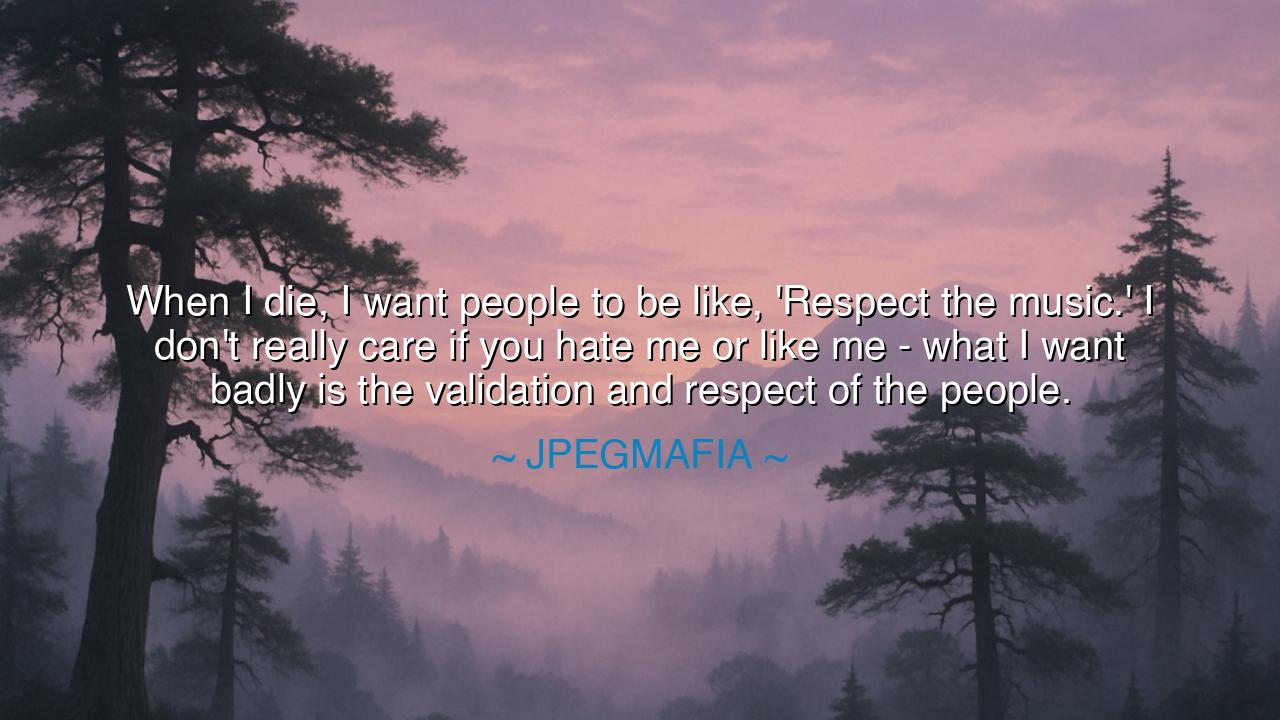
When I die, I want people to be like, 'Respect the music.' I
When I die, I want people to be like, 'Respect the music.' I don't really care if you hate me or like me - what I want badly is the validation and respect of the people.






Hear the voice of JPEGMAFIA, who spoke not of wealth, nor of applause, but of the longing at the heart of every artist: “When I die, I want people to be like, ‘Respect the music.’ I don’t really care if you hate me or like me – what I want badly is the validation and respect of the people.” These words strike like a drumbeat in the silence, for they reveal the ancient truth that art is greater than the artist, and that the legacy of creation outlives the fleeting judgments of men.
The meaning of these words lies in the distinction between personal approval and artistic recognition. JPEGMAFIA does not demand to be loved, for love is fickle, nor does he demand to be praised, for praise can be shallow. What he demands is respect, the acknowledgment that his music carries weight, that it speaks a truth worth remembering. To respect the music is to honor the labor, the pain, and the spirit poured into it. In this way, the artist’s soul finds immortality, not in adoration, but in validation.
The origin of this yearning is as old as song itself. Poets of ancient times did not always live as kings, nor were they always beloved, but they sought to leave behind words that would echo in eternity. Consider the Greek poet Sappho, whose work was often criticized in her own time, yet whose fragments still speak of love and longing across millennia. She, too, did not ask to be universally adored, but to have her music respected, preserved, and validated by the people of the future.
History gives us countless examples of this truth. Vincent van Gogh died penniless and scorned, his art dismissed by the critics of his day. Yet now his paintings hang in the world’s great halls, revered not for the man he was thought to be, but for the passion his art embodies. What he lacked in life—validation and respect—came only after death. In the same way, JPEGMAFIA’s cry is not for fleeting love, but for the enduring acknowledgment that what he created mattered.
There is also in his words a declaration of freedom. By saying he does not care if he is hated or liked, he proclaims liberation from the chains of popularity. He aligns himself with truth rather than approval, with authenticity rather than flattery. For to live by the world’s applause is to live in chains, but to live for the respect of the art is to live with dignity. In this, JPEGMAFIA speaks not only for musicians, but for all creators who pour themselves into their craft.
The lesson for us is clear: when you create, when you labor, when you strive to bring something into this world, do not anchor your worth in whether people like you. Instead, pour yourself fully into the work itself, and let its integrity demand respect. People may love you today and despise you tomorrow, but if your work carries truth, it will endure beyond both love and hate.
And so, let your actions follow. Strive not for popularity but for authenticity. Create with honesty, labor with integrity, and let your works speak even when you are gone. Do not fear being misunderstood, nor despair if you are unliked. Seek only to leave behind something that commands respect. For respect, once given, cannot be taken back—it roots itself deep in the soil of history.
Thus remember always the wisdom of JPEGMAFIA: “Respect the music.” Respect not only the song, but the spirit behind it. Respect not only the artist, but the truth they carried into the world. For in the end, fame withers, applause fades, but respect—earned through authenticity and sacrifice—endures like stone against the storms of time.






AAdministratorAdministrator
Welcome, honored guests. Please leave a comment, we will respond soon